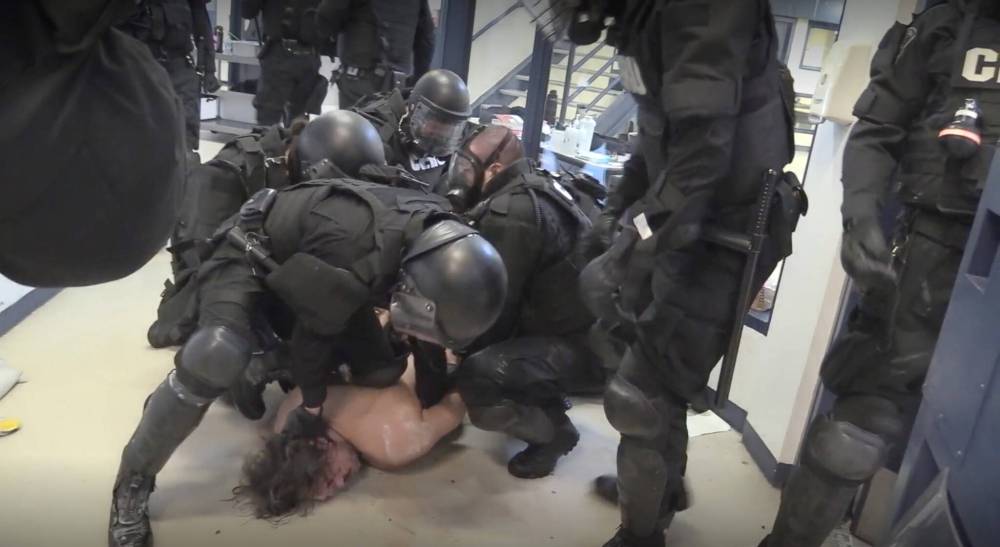A correctional officer broke down in tears in the arms of his wife as a judge acquitted him Friday in the death of an inmate at the Headingley jail.
“The death of Mr. Ahmo represents a terrible tragedy… (but) the evidence before me does not satisfy me of (Robert Morden’s) guilt beyond a reasonable doubt on these charges,” provincial court Judge Tony Cellitti said.
Members of William Ahmo’s and Morden’s families, corrections officers and others filled the large court gallery to capacity to hear the verdict.

A still from video evidence presented at court during the trial of Robert Jeffrey Morden. William Ahmo, pinned to the floor and fully restrained, told corrections officers more than a dozen times that he couldn’t breathe.
Several of Ahmo’s family members wore T-shirts with Ahmo’s picture and his last words, “I can’t breathe.”
The hearing was delayed for nearly half an hour as people continued to stream into the courtroom, with additional seating being added to the aisles.
Morden sat next to his wife, a few feet behind his lawyers, Daniel Wolson and Richard Wolson.
Cellitti’s decision was delivered nearly a year after closing arguments were heard in the case.
Morden pleaded not guilty to criminal negligence causing death and failing to provide the necessities of life.
Outside court, tears rolled down Louise Menow’s face as she reacted to the verdict and shared memories of Ahmo.
“I want justice for my friend,” she told reporters, while the Ahmo family’s supporters gathered. “He was more than a friend. He was like a brother to me.”
Menow said she did not agree with the verdict.
“I really don’t think that’s fair,” she said. “Our justice system needs to do better when it comes to situations like this. He did not deserve to go this way.”
Ahmo, 45, died in hospital on Feb. 14, 2021. Seven days earlier, the Sagkeeng First Nation man was shackled, pinned to the ground, placed in a spit hood and strapped into a restraint chair in the common area of his unit after a three-hour standoff with guards at the Headingley Correctional Centre.
Morden led the tactical team that responded to the standoff.
Court heard evidence Ahmo flew into a violent, destructive rage after he was told a racist joke, resulting in dozens of inmates in his unit being locked in their cells.
Manitoba’s chief medical examiner deemed Ahmo’s death a homicide. The inmate died from a brain injury caused by a heart attack as he struggled to breathe, a trial heard last year.
Ahmo was in an “extremely agitated” state and exhausted when he was forced into a prone position for several minutes, with his chest pressed to the floor, making it difficult for him to breathe, pathologist Dr. Charles Littman testified.
The inmate had an enlarged heart, was obese and had been hit with pepper spray before the takedown, all of which would have compromised his ability to breathe effectively, Littman said.
Video played in court showed Morden and other guards storming the unit and firing chemical irritant projectiles at Ahmo as the inmate stood on a second-floor walkway.
Ahmo, brandishing a broken mop handle, advanced on the officers, who forcefully took him to the floor. Ahmo screamed and flailed as officers piled on top of him, forcing his face and neck to the floor.
He told officers more than 20 times while restrained on the floor: “I can’t breathe.”
Ahmo, unmoving, was placed in a restraint chair, after which he was found to have no pulse. A “code red” was issued.
Crown attorney Jason Nicols said officers had no training for the restraint chair, which under the circumstances would have compromised Ahmo’s ability to breathe. Nicol said that under the jail’s use-of-force policy at the time, the chair was to be used only in cases in which an inmate posed a risk of self-harm.
“The evidence is overwhelming that Mr. Ahmo was in distress and required urgent medical attention,” Nicol told Cellitti in a closing argument on Sept. 25.
“We don’t need a medical professional to tell us breathing is essential to life.”
Richard Wolson said his client had every reason to believe Ahmo was saying he couldn’t breathe was connected to the earlier use of pepper spray. The lawyer also argued officers were allowed to use the restraint chair, which was the best way to transport “high-risk” inmates to other areas of the jail, and had the tacit approval of Morden’s superiors.
— with files from Chris Kitching
dean.pritchard@freepress.mb.ca

Dean Pritchard
Courts reporter
Dean Pritchard is courts reporter for the Free Press. He has covered the justice system since 1999, working for the Brandon Sun and Winnipeg Sun before joining the Free Press in 2019. Read more about Dean.
Every piece of reporting Dean produces is reviewed by an editing team before it is posted online or published in print — part of the Free Press‘s tradition, since 1872, of producing reliable independent journalism. Read more about Free Press’s history and mandate, and learn how our newsroom operates.
Our newsroom depends on a growing audience of readers to power our journalism. If you are not a paid reader, please consider becoming a subscriber.
Our newsroom depends on its audience of readers to power our journalism. Thank you for your support.